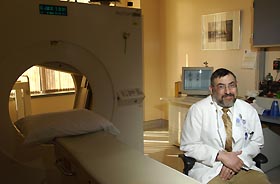|
This is an archived article.
For the latest news, go to the
Advance Homepage
For more archives, go to the Advance Archive/Search Page. | ||
|
Health Center Offers New Treatment
The treatment, developed by scientists and doctors after more than a decade of work, successfully uses the chemical attraction of antibody to antigen to deliver radiation to specific cancer cells. An antigen is a protein on the surface of a cell that makes antibodies react when an immune system response is required.
With that biological process in mind, the researchers engineered an antibody that binds to the CD-20 receptor cell typically present in the non-Hodgkin's lymphoma. The antibody, which was recently approved by the Food and Drug Administration, is known as Zevalin. "The data from the Zevalin clinical trials shows tumor shrinkage and improvement in the quality of life for 80 percent of the patients," said Ronald Weiner, an associate professor of diagnostic imaging and therapeutics and one of the researchers doing the investigation. The Health Center's Dr. Robert Bona, a specialist in hematology/oncology, is also participating. Patients with low-grade, non-Hodgkin's lymphoma typically have responded positively to radiation therapy. But that therapy is imprecise and can cause damage or even kill normal cells in the areas of the cancer being treated. Using the cancer-cell specific antibody, however, physicians can attach a minimal dose of radioactive isotope to it. It is a more precise treatment than radiation therapy and so less likely to harm nearby normal cells. Zevalin can be tagged with two different radioactive isotopes, 111Indium or 90Yterium. The doctors first treat the patient with a small dose of 111In-Zevalin to see if there is a normal distribution throughout the body. This makes sure that the antibody is not excreted too quickly, which could cause the treatments to be ineffective. A week or nine days later the patient is infused with a therapeutic dose of 90Y-Zevalin. The 90Y-Zevalin, binds to the antigen and lodges there; the radioactivity then kills the cancer cell directly. Weiner says the successful treatments are an exciting development. "Nuclear medicine investigators have worked for more than 10 years to develop these antibody agents to treat cancer," he says. "It's been a long, slow, difficult process that now gives hope to people with non-Hodgkin's lymphoma and other cancers." The Health Center was the first institution in Connecticut to treat patients with Zevalin, and second in the U.S. to treat patients with Zevalin after the U.S. Food and Drug Administration approved it. |
 linicians in
the UConn Health Center's Division of Nuclear Medicine are among
the first in Connecticut to use an innovative and promising new
treatment for non-Hodgkin's lymphoma, a frequently occurring
cancer of the lymph system.
linicians in
the UConn Health Center's Division of Nuclear Medicine are among
the first in Connecticut to use an innovative and promising new
treatment for non-Hodgkin's lymphoma, a frequently occurring
cancer of the lymph system.
